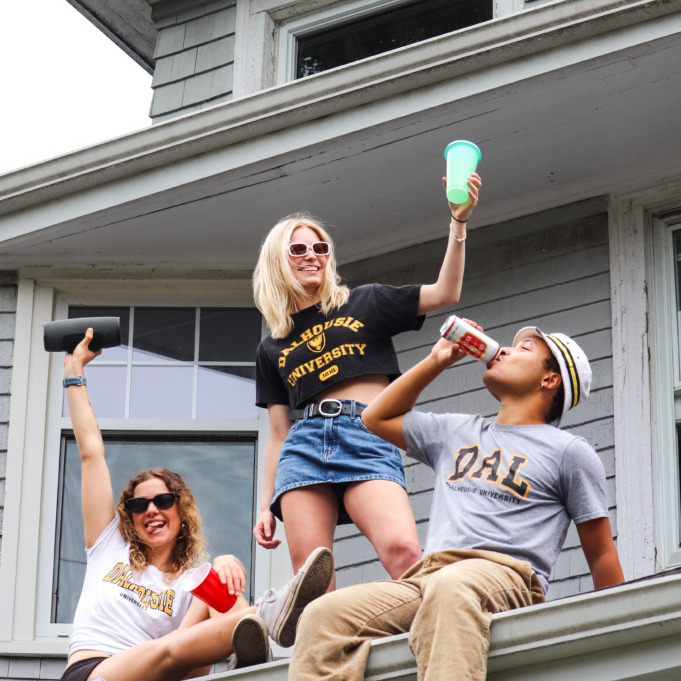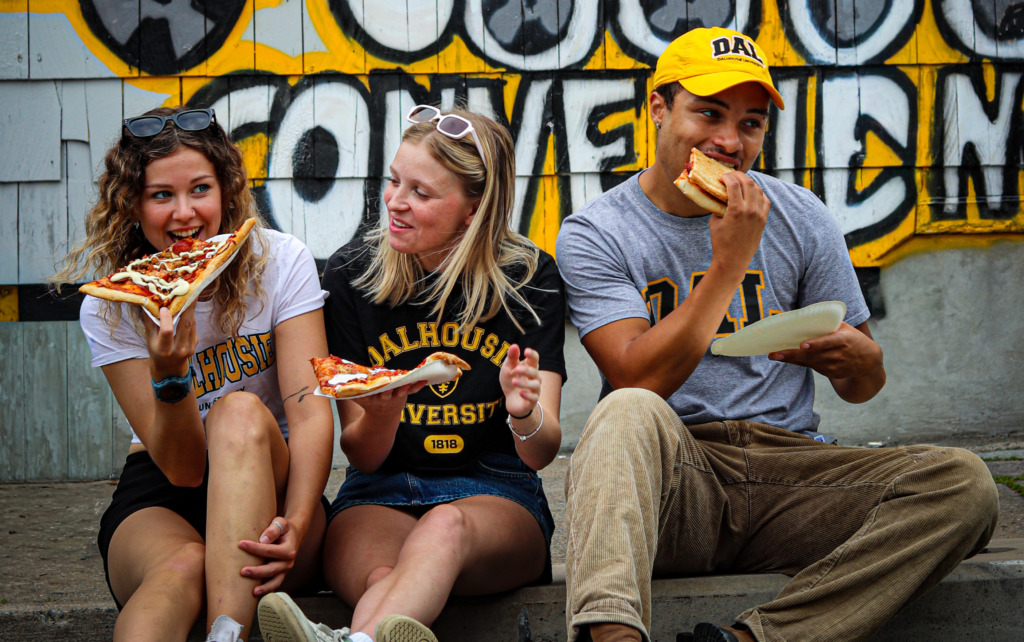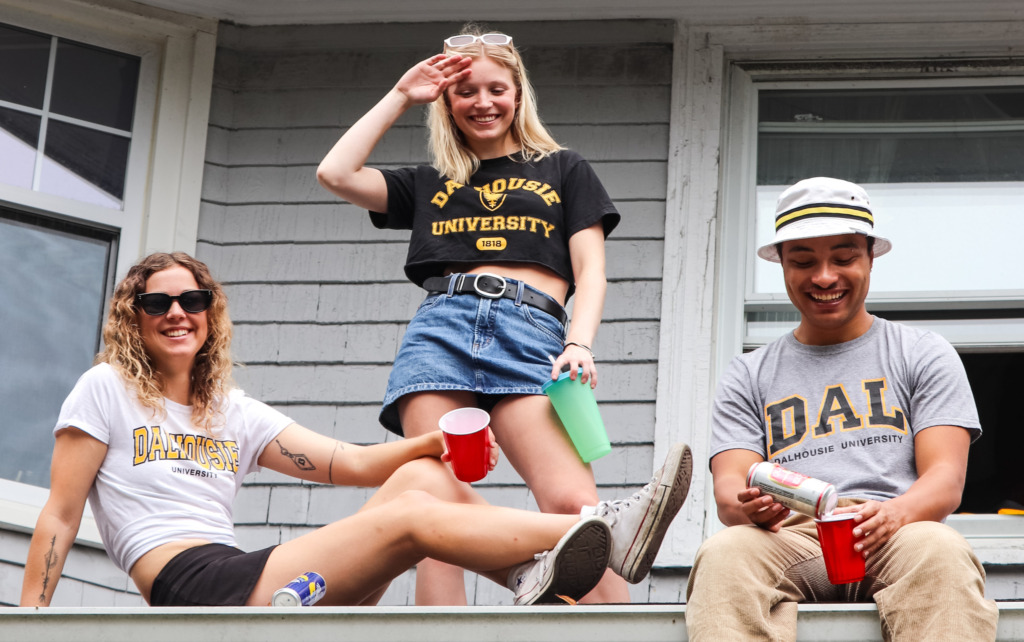
Police spend $100,000 countering 2024 homecoming street party
Neighbourhood residents say the crowd has shrunk in recent years, but policing has increased
Every fall, black and gold-clad students crowd Darius Korin’s street to celebrate Dalhousie University’s homecoming.
Drunken attendees spill onto the fourth-year Dalhousie student’s lawn, overflowing from an unsanctioned party on Jennings Street. The street is the epicentre of an ongoing struggle between students’ desire to party and neighbourhood residents’ desire to avoid wannabe Project X. Last year, though, the flood of students was closer to a trickle.
“It’s been a dwindling crowd over the last two years, whereas the police response has been increasing,” says Korin.
A freedom of information request filed by the Dalhousie Gazette shows that Halifax Regional Police spent just over $100,000 on officer overtime salaries to counter a September 2024 street party in the neighbourhood surrounding the university. A fall 2023 gathering ran up a $95,000 bill, according to the Gazette’s freedom of information request for the policing costs of the last three homecoming street parties.
Policing efforts ramped up following a fall 2022 street party, which saw thousands of students gather around Larch, Jennings and Preston Streets. Fires were set, one person was stabbed, there was significant property damage and police recovered firearms from the crowd, according to HRP spokesperson Const. Martin Cromwell. Police issued 122 summary offence tickets, and two men were charged with criminal offences.
The policing bill for 2022? Zero dollars. Police only used shift resources to respond to the street party, preventing additional overtime costs, according to the freedom of information request.
Unsanctioned street parties have been an annual neighbourhood occurrence since 2017, the same year Dalhousie banned alcohol from residences during orientation week. The possession and consumption of alcohol is currently banned on campus, other than in private residence rooms and licensed bars.
Dr. Caitlin Lees moved to the area with her two young kids in 2018. She has a good relationship with students, other than on homecoming weekend.
“Everybody descends on your neighbourhood. Most people are there just having a good time, but there are also people coming who don’t have good intentions.
“It feels scary and threatening towards myself and my property, but it also scares me for the students partying.”
Korin, on the other hand, isn’t bothered. The street parties are a tradition he’s accepted.
“Regardless of what happens, there’s always going to be students. As long as people are being safe, people should have the right to party.
“We have to be a little careful about keeping doors locked and making sure no one is running into the house,” Korin says. “I’m able to easily talk to students if we don’t want them on our porch and potentially harming themselves on our property.”

Last September, Halifax police dispatched 114 officers over three days to combat the street party.
“Even after they realize nothing is happening, the policing goes into the night,” Korin says.
In 2024, eight officers were paid triple overtime, 52 were paid double overtime and 54 were paid time and a half. Two of the officers who received double overtime clocked 19.5-hour-long shifts.
“Police won’t even pretend they’re busy,” Korin says. “At times, they’ll just walk up and down the streets chit-chatting with their partner, or organize in a huddle and chat for hours. It seems like they’re robbing the system, trying to take this overtime.”
Lees, an emergency room doctor, says the 2024 policing bill is reasonable.
“One of the outcomes of these parties is that people get injured, become really intoxicated and need to be in the emergency department,” she says. “It does divert resources, and we’re so incredibly over capacity.
“This $100,000 keeps the community safe because they can continue to access the resources they need.”
The Gazette asked a Dalhousie spokesperson if the university financially contributed to the policing bill. The spokesperson did not address the question and instead emailed a statement condemning street parties and highlighting the university’s on-campus homecoming events.
Cromwell says the university doesn’t subsidize any of the policing costs.
“Dalhousie University contributes to the costs of policing sanctioned events only,” he says. “While we agree the cost of policing these parties is significant, it is also the cost of ensuring public safety.”
The HRP annual budget for 2024–2025 is about $98 million or $268,524 per day, a 6.1 per cent increase from the previous year’s $92,345,000 budget.
Operation Fall Back
Police run Operation Fall Back annually throughout September “to quell disruptive behaviour,” according to Dalhousie’s website. The operation puts additional police patrols in university-area neighbourhoods during the back-to-school season.
About $19,000 of the $100,000 total was spent on police overtime wages a week before the street party.
Cromwell said the $19,000 was a necessary expense because “unsanctioned parties” that were “expected to draw big crowds” were planned for one week before homecoming.
Korin didn’t see any big crowds. A week before 2024’s homecoming, he was sitting alone on his porch while police patrolled the empty street.
“I was just drinking my coffee and listening to some music on a handheld speaker when a police officer ran up on the porch and threatened me with a noise complaint,” he says.
“I was very taken aback. This large guy was screaming and looking for a reason to justify being there. Since I was the only person outside and I didn’t want to put myself in danger, I turned the music down. It was definitely a little scary.”

Fewer students on the streets
Korin says that last year, fewer students gathered for homecoming than he expected.
“I wouldn’t say it was completely dead, but it’s definitely dwindling.”
Police issued about three dozen tickets under the Liquor Control Act at the 2024 street gathering, down from 93 tickets the previous year.
Dalhousie hosted a football game, beer garden and food trucks on campus for last year’s homecoming.
Korin speculated that university-organized events kept some students off the streets, but added that Dalhousie is “willfully ignorant” about its role in the unsanctioned parties.
“They can do a better job providing fun, free and safe activities,” he says. “Why doesn’t Dalhousie put together its own street fair or something? That would draw a lot of students, and I think it’s a lot safer.”






